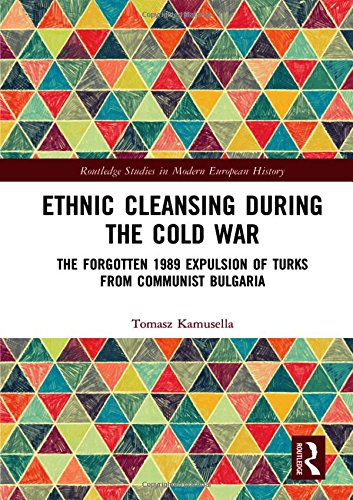

Most ebook files are in PDF format, so you can easily read them using various software such as Foxit Reader or directly on the Google Chrome browser.
Some ebook files are released by publishers in other formats such as .awz, .mobi, .epub, .fb2, etc. You may need to install specific software to read these formats on mobile/PC, such as Calibre.
Please read the tutorial at this link: https://ebookbell.com/faq
We offer FREE conversion to the popular formats you request; however, this may take some time. Therefore, right after payment, please email us, and we will try to provide the service as quickly as possible.
For some exceptional file formats or broken links (if any), please refrain from opening any disputes. Instead, email us first, and we will try to assist within a maximum of 6 hours.
EbookBell Team

4.0
56 reviewsIn mid-1989, the Bulgarian communist regime seeking to prop up its legitimacy played the ethnonational card by expelling 360,000 Turks and Muslims across the Iron Curtain to neighboring Turkey. It was the single largest ethnic cleansing during the Cold War in Europe after the wrapping up of the postwar expulsions (‘population transfers’) of ethnic Germans from Central Europe in the latter half of the 1940s. Furthermore, this expulsion of Turks and Muslims from Bulgaria was the sole unilateral act of ethnic cleansing that breached the Iron Curtain. The 1989 ethnic cleansing was followed by an unprecedented return of almost half of the expellees, after the collapse of the Bulgarian communist regime. The return, which partially reversed the effects of this ethnic cleansing, was the first-ever of its kind in history. Despite the unprecedented character of this 1989 expulsion and the subsequent return, not a single research article, let alone a monograph, has been devoted to these momentous developments yet. However, the tragic events shape today’s Bulgaria, while the persisting attempts to suppress the remembrance of the 1989 expulsion continue sharply dividing the country’s inhabitants. Without remembering about this ethnic cleansing it is impossible to explain the fall of the communist system in Bulgaria and the origins of ethnic cleansing during the Yugoslav wars. Faltering Yugoslavia’s future ethnic cleansers took a good note that neither Moscow nor Washington intervened in neighboring Bulgaria to stop the 1989 expulsion, which in light of international law was then still the legal instrument of ‘population transfer.’ The as yet unhealed wound of the 1989 ethnic cleansing negatively affects the Bulgaria’s relations with Turkey and the European Union. It seems that the only way out of this debilitating conundrum is establishing a truth and reconciliation commission that at long last would ensure transitional justice for all Bulgarians irrespective of language, religion or ethnicity.